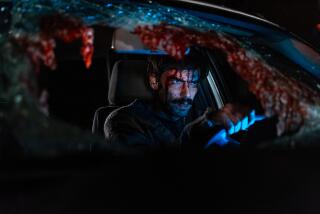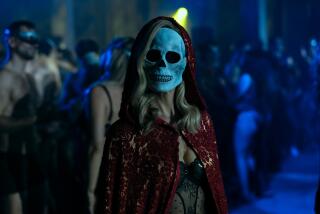Review: German import ‘Dark’ engrossingly lives up to its name on Netflix
“Dark,” which begins streaming Friday on Netflix, is a beautiful, German-made minor-key tone poem in the shape of a puzzle-box sci-fi mystery television series.
Created by Jantje Friese (who writes) and Baran bo Odar (who directs), the series is set in 2019 and 1986, in and around a smallish German town, surrounded by fairy tale forest and dominated by the squat concave cooling towers of a nuclear plant. Its presence casts a shadow across the story — if not a shadow across the scene, given there’s no sun out to make that happen.
Long inhospitable to any television not delivered in English, domestic audiences have grown more amenable to the idea in the age of acquired content; we understand that “Scandinavian mystery” is its own genre. Unlike many subtitled series that have been imported to our television-shaped shores, “Dark” is an original production, the first German-language production for Netflix. Of course, we have heard German spoken on our TVs before, with characters allowed an occasional “Was ist los?” or “Jawohl, Herr Oberleutnant.” But it is good to get the full immersion package.
The series has, notably, several things in common with its slightly older Netflix cousin “Stranger Things,” though the mood is more Stanley Kubrick than Steven Spielberg, and more naturalistic than either. “Dark’s” creators tell their uncanny story in a straightforward, even stately way, and do not draw out suspense only in order to pile in funhouse thrills.
As in “Stranger Things,” there is a place where one reality abuts another, and a person or persons who are attempting to control it, with science, maybe. (There are early hints.) There is a missing child. And there is the recreated 1980s. But the wide-ranging viewer may also be reminded of “Life on Mars” (the British, not the American version) or “The Returned” (the French, not the American version).
Like the recently revived “Twin Peaks,” with which “Dark” also shares some tonal predilections, it gives you a lot to keep track of with three generations of characters spread across two permeable time periods. Parents with teenagers in the 2019 segment are teenagers with parents in 1986. In both eras, perhaps more than coincidentally, a boy has gone missing.
Time is the essence of “Dark”; the creators are not coy about it. The series begins with an epigram from Einstein to the effect that the difference between past and future is nothing but a “persistent illusion.” Graffiti reads “No future,” and a significantly displayed book is titled “A Journey Through Time.” Scars, which at least three characters bear, are said to “sense rain… They can see into the future.” More than once we are told that the question is not “how” or “where,” but “when.”
“There are things out there that our little minds will never comprehend,” says one character to another, like Hamlet to Horatio. “Just because you can’t see beyond your nose doesn’t mean there aren’t things going on out there,” says another. And to be sure, there are.
The atmosphere is close; Teutonic sorrow abounds. We understand from the beginning that some sort of curse has descended upon this place -- the story begins with a suicide, by hanging, in an artist’s studio, for a touch of old-fashioned continental Romanticism. There is that already missing boy. Apart from a brief noisy breakfast among one outwardly happy family -- whose father we know is cheating on his wife -- there is not much in the way of comedy.
One feels the creators might have christened the series after watching it, for it is also literally very dark, much of it set at night, lit by flashlight, streetlight or moonlight. Even the daylight scenes are gray and wet, the interiors often gloomy. Blues and grays and greens predominate, with an occasional contrasting color struggling against the pallete. The photography, by Nikolaus Summerer, is beautifully composed, but feels more witnessed than manipulated. The camera stays still, save for when it needs to sprint.
I have seen only the first three episodes, and there is of course the chance that the payoff will be unequal to what comes before, and that you will finish “Dark” feeling something like “I watched 10 hours of this German television show and I all I got was an explanation.” But that is often the way with payoffs.
The point of a story like this is where it takes you, and this does take you somewhere rich and strange. As familiar as its elements may be, its pleasures are particular and many.
‘Dark’
Where: Netflix
When: Any time, starting Friday
Rating: TV-MA (may be unsuitable for children under the age of 17)
Dark
Follow Robert Lloyd on Twitter @LATimesTVLloyd
More to Read
The complete guide to home viewing
Get Screen Gab for everything about the TV shows and streaming movies everyone’s talking about.
You may occasionally receive promotional content from the Los Angeles Times.







